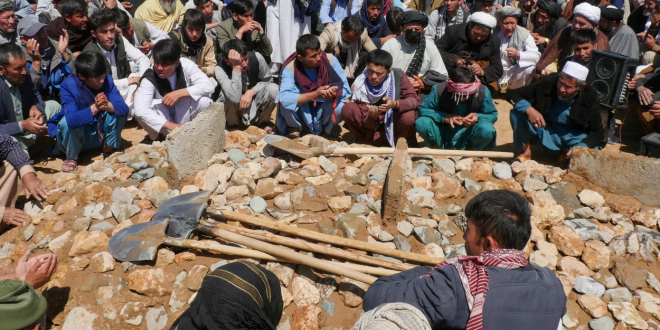AT News
KABUL – The Islamic State terrorist group has claimed responsibility for a harrowing gun assault targeting a Shiite mosque situated in western Herat province. The assailants struck on Monday evening, leaving six worshippers slain and one wounded, according to statements from Interior ministry spokesman Abdul Mateen Qani on Tuesday morning.
Reports indicate that an unidentified armed assailant opened fire upon civilian worshippers within the mosque premises located in Herat province’s Guzara district around 9:00 pm local time. However, the official account diverges from the IS group’s assertion, as the regional chapter of IS claims multiple gunmen stormed the sacred site armed with machine guns.
The mosque, known to serve the minority Shiite community, fell victim to the violent rampage, resulting in the tragic loss of lives, including that of an imam and a three-year-old child. Eyewitnesses recount a distressing scene of chaos and terror as the assailants barged in during prayer time, indiscriminately targeting worshippers.
Ibrahim Akhlaqi, the brother of the slain imam, recounted the horrific ordeal, stating, “One of them was outside and two of them came inside the mosque, shooting the worshippers. It was in the middle of prayers.” The brutal attack has left the community reeling with grief, as survivors and locals struggle to come to terms with the senseless loss of life.
Despite assurances from Taliban authorities to safeguard religious and ethnic minorities following their return to power in August 2021, concerns persist regarding their efficacy in addressing security threats. The Islamic State’s regional chapter continues to pose a significant menace in Afghanistan, particularly targeting Shiite communities.
The recent attack adds to a string of violent incidents attributed to IS, including the heinous suicide bombing at an education centre in 2022, which claimed the lives of 53 individuals, mostly young girls and women. Despite assertions by Afghan authorities regarding the eradication of IS presence, concerns persist over the group’s resilience and capacity to perpetrate further atrocities.
Moreover, the United Nations Security Council report released in January underscored the ongoing threat posed by IS, citing their sustained recruitment efforts and ability to project terror beyond Afghanistan’s borders. The group’s claim of responsibility for the deadly attack on the Crocus City Hall concert venue in Moscow further underscores the global reach of their malevolent agenda.
As the Afghan populace mourns the loss of innocent lives and grapples with escalating security concerns, the need for robust counter-terrorism measures and concerted international efforts to combat extremist ideologies becomes increasingly imperative. The tragic incident serves as a stark reminder of the enduring threat posed by militant groups and the imperative of collective action to safeguard peace and stability in the region.
 Afghanistan Times
Afghanistan Times




